
Steven Leigh Morris – LA Weekly
Playwrights under 40 write mainly about love and politics, or so the adage goes; playwrights over 40 write mainly about death.
By the time Samuel Beckett’s Happy Days premiered in 1961, the great Irish bard was 55, which should make its subject fairly easy to guess. Originally a poet and novelist, Beckett didn’t write his first play until he was 42. Who could blame the visionary surrealist for his preoccupation with The End? Read more…
Neal Weaver – Stage Raw
In the midst of a desolate landscape, a huge mound of parched earth rises, occupied only by a few rocks, scraggly clumps of dead grass, and a woman, Winnie (Brooke Adams), who’s buried up to her chest in the earth. She’s slumped forward in an attitude of unconsciousness or despair. A deafening alarm bell brings her slowly to wakefulness. She surveys her surroundings, smiles, and exclaims, “Another lovely day!” Read more…
Myron Meisel – The Hollywood Reporter
In perhaps the most singular, iconic image of all mid-century Theater of the Absurd, Winnie in Happy Days awakens buried “up to her titties” in a mound of sandy dirt. By Act II, she has sunk deeper into the earth, up to her chin. Yet Winnie faces each morning with a nearly indomitable optimism that somewhere in her circumscribed existence she will find enough quotidian detail or recollected reverie to will herself to another “happy day.” Read more…
Now running through October 12.

